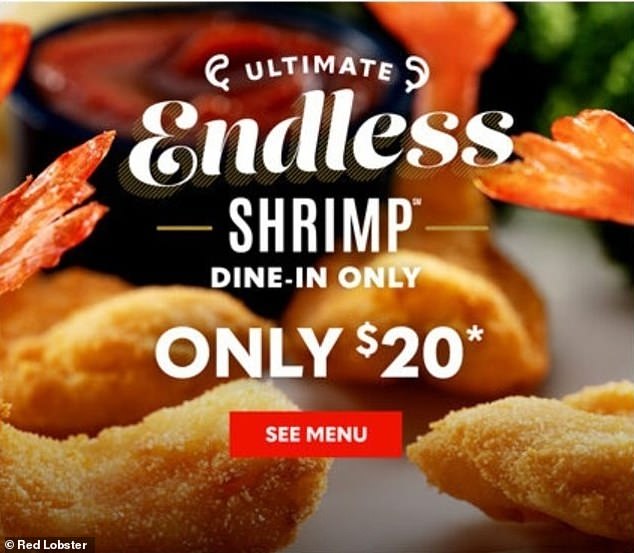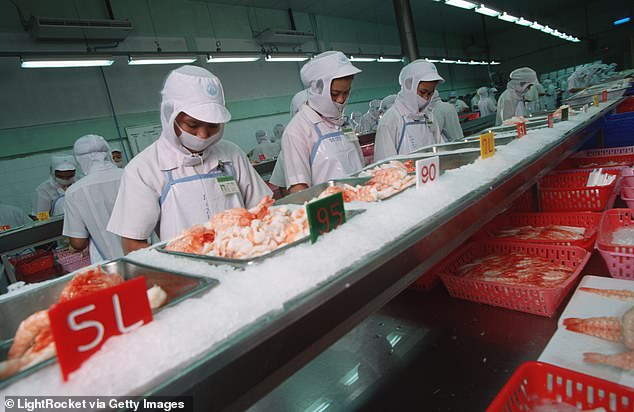New owners for Red Lobster revealed – as it emerges the debt-ridden chain owes $21 million for shrimp alone
Bankrupt Red Lobster announced its new owners on Monday, but also said the company may owe its parent company a staggering amount for millions of pounds of shrimp.
RL Purchaser LLC, an entity comprised of Red Lobster’s lenders, made the initial offer, which has not been challenged by any outside party to date.
The struggling seafood chain filed for bankruptcy in May after closing nearly 100 restaurants in the U.S.
There are already rumors of more closures if landlords cannot negotiate down rents.
Judge Grace E. Robson of the U.S. Bankruptcy Court for the Middle District of Florida will decide on July 29 whether the proposed sale can proceed.
Meanwhile, Red Lobster has about $300 million in debt, some of which stems from the 3.75 million pounds of shrimp the company bought from current owner Thai Union Group, according to a document filed in bankruptcy court by Thai Union’s attorneys.
Red Lobster to close 100 more restaurants if it can’t negotiate lower rent

Endless shrimp started at $20 but was too popular and cost millions of dollars
Thai Union, a Thailand-based seafood producer, estimates that this amount of raw shrimp is worth approximately $20.6 million.
This valuation is based on the value of the inventory itself, plus the cost of additional ingredients for the breaded shrimp, packaging, storage, and any interest that accrues on Red Lobster’s balance.
Lawyers for Thai Union explain that Red Lobster repeatedly increased its expected demand for shrimp in 2023, presumably to meet the $20 all-you-can-eat shrimp offer it launched in June.
But demand changed last October when Red Lobster “unexpectedly and dramatically lowered their forecast several times,” Thai Union claimed.
This was about the time that Red Lobster executives realized they had made a tragic mistake. They decided to raise the price of the all-you-can-eat shrimp special to $22 at select locations to offset the losses.
Due to declining demand from its subsidiary, Thai Union says it has created “a surplus of approximately 5,850,000 pounds of 14/16 pre-breaded coconut and 21/23 pre-breaded large shrimp,” both custom products.
Then, in November, Red Lobster reportedly requested significantly fewer “Calabash” shrimp, another specialty product, leaving Thai Union with another 1.6 million pounds of shellfish.
Thai Union now claims that after Red Lobster’s debtors purchased $13.07 million worth of shrimp, the company still owes “approximately $3,684,541 in related costs, including ingredients, packaging, storage and interest.”
In a June 28 filing, the debtors claimed they were owed $0, citing the joint supply agreement Red Lobster and Thai Union entered into in 2019.
Because Thai Union has objected to the debtors’ proposed recovery amount, a hearing will be held in August to resolve this debt dispute, but only after the sale to creditors has been completed.
Experts and even executives at Thai Union have acknowledged that Red Lobster’s unlimited shrimp deal, a move the company introduced in June with the intention of making it permanent, was a massive miscalculation that plunged the company into financial insolvency.

Workers at the Thai Union Frozen food processing plant just outside Bangkok clean and prepare fresh cooked shrimp
Thai Union CEO Thiraphong Chansiri, 58, even said out of frustration that he will never eat lobster again after the bankruptcy.
When customers found out last summer that they could feast on as much shrimp as they wanted, they immediately went to work to drain the restaurant.
One girl managed to eat 108 shrimp in four hours.
“I set a new record at my local Red Lobster, this is the biggest accomplishment of my life,” the poster said in her video.
More people took up the offer than the company had anticipated. But instead of pulling the deal, bosses kept it going for six months—and the losses exceeded the amount lost on the endless crab offer it had made 20 years earlier.
In all, Thai Union had to write off $500 million in an effort to free itself from its financial anchor Red Lobster.
